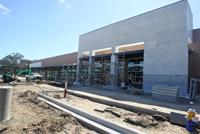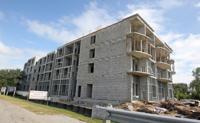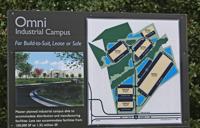Charleston’s commercial real estate market is ‘on fire’ and boom expected to continue
- October 30, 2017
- Our Company
Commercial real estate agent Leslie Fellabom looked out over a gathering of 500 or so of her peers recently and proclaimed it’s a great time to be in the property-selling-and-buying business in Charleston.
“Our market is on fire,” the Avison Young senior vice president said. “The real estate market is booming.”
In every sector of the Charleston market — office, retail and industrial — vacancy rates come in below 10 percent, and the building boom shows little signs of slowing down in the immediate future.
Office space
On the office market, Fellabom said the vacancy rate stands at 7.2 percent, a mark below 10 percent for the fifth straight year. Driven by more aerospace and automotive jobs and increases in information and finance workers, the area’s office market also is seeing a boost from the growing Port of Charleston.
“The growth in export-related advanced manufacturing is powering an impressive multiplier effect, resulting in the demand for more jobs,” she said. “Forty-five percent of the jobs created in the past 12 months were in the office-occupier sector. That’s four times faster than the U.S. average.”
Fellabom also said advancements in technology are influencing the workforce and lifestyles.
“The square footage requirement today is half of what it was 10 years ago,” she said.
Several new office products were delivered or will be this year, including sites on upper King Street in Charleston, Coleman Boulevard in Mount Pleasant, Clements Ferry Road in Cainhoy, Island Park Drive on Daniel Island, and Ingleside Boulevard and Leeds Avenue in North Charleston.
Over the next three years, more office space will be provided in Charleston through WestEdge on the western peninsula, at Meeting and Calhoun, and other developments at Huger, Broad and Romney streets and Morrison Drive.
In Mount Pleasant, office space is planned at Ferry Wharf beside the Ravenel Bridge and on McGrath Darby Boulevard and Belle Isle Avenue. On Daniel Island, Blackbaud is building a new headquarters site.
In North Charleston, offices will come to Garco Mill and the T-Mobile makeover of the former Kmart on Rivers Avenue. Other office product will come to Nexton near Summerville.

Whole Foods Market is building a second Charleston-area store in West Ashley. Leroy Burnell/Staff
Retail revolution
The retail revamp will continue with “tired malls” getting makeovers as entertainment, eating and drinking venues while retailers with a brick-and-mortar presence will have to operate online as well to survive, said Alan Freeman of The Shopping Center Group.
“We will never be in a completely online market,” Freeman said.
He pointed to several retail developments in the Charleston region as evidence that the brick-and-mortar market continues to grow.
In West Ashley, Whole Foods Market is adding a second store in the region while, in Mount Pleasant, Costco Wholesale and Home Depot plan to build stores and Lowe’s is adding a second home improvement warehouse. Lowes Foods also plans to add a store in northern Mount Pleasant.
In Summerville, Sam’s Club is on the way to Nexton while Academy Sports, Burlington and Hobby Lobby are jockeying for sites, according to Freeman. Lowes Foods also is adding a grocery store.
In North Charleston, Burlington plans to take over part of the former Sears space at Northwoods Mall while Old Time Pottery moved into a large empty site at North Charleston Center at the end of Aviation Aviation.
Burgeoning retail areas are Cainhoy and Nexton in Berkeley County and the upper peninsula of Charleston. Those parts of the Greater Charleston area are expected to see thousands of new homes and apartments over the next few years.
“Retail follows residential,” Freeman said.

A 108-room Staybridge Suites hotel is rising at the base of the Ravenel Bridge off Johnnie Dodds Boulevard in Mount Pleasant. Leroy Burnell/Staff
Heads in beds
In the hotel sector, Jennifer Bagwell, president of the Charleston Area Hospitality Association and general manager of Springhill Suites in Mount Pleasant, said occupancy is 80 percent so far this year, up from 71.1 percent last year at this time, the average daily rate per room is up more than $3 to nearly $157 and revenue per available room grew by about $4 to more than $127.
The Charleston market also is outperforming Greenville, Savannah and Nashville, Tenn., on all three variables, she said.
“The fourth quarter looks good with continued growth in 2018,” Bagwell said.
Affecting the hospitality market are short-term rentals, which grew from 140 Airbnb listings in October 2014 to 969 in May of this year.
She said the recent figure is equivalent to the number of rooms in two Belmond Charleston Place Hotels and, if taxed as a hotel, would have brought in $1.2 million in 2016 alone.
Other problems facing the hospitality market include labor and balancing tourism with livability in the growing visitor sector.

Omni Industrial Campus on Interstate 26 in Berkeley County offers several sites for future industries. Nutritional supplements maker Thorne Research recently dedicated its building under construction in the industry complex. Leroy Burnell/Staff
Building on speculation
On the industrial side, Lee Allen with commercial real estate firm Jones Lang Lasalle said the Charleston market “is seeing a significant amount of speculative development underway,” especially near Jedburg and Palmetto Commerce Park in North Charleston.
The industry segment currently has a five-year-low vacancy rate of 7.5 percent, but Allen cautioned that if tenants aren’t found soon to occupy some of the new product coming to market, that figure could rise.
“If we don’t see absorption by November, you could see double-digit vacancy for the first time in a while,” Allen said.
He also believes rent per square foot will rise from $5.66 now to $6.20 for top-end space by 2020. And rental rates for so-called Class-P properties, which are a bit lower, will increase as well, he predicts.
Driving speculative development is the growth of the Port of Charleston as cargo shifts from the West Coast to the East Coast with the completed expansion of the Panama Canal. The increased presence of major industries such as Boeing, Mercedes-Benz Vans and Volvo in the Charleston region are market forces as well.
Since 2013, 20,286 jobs have been announced in the three-county area through $4.6 billion in investments. The infusion of money is helping to spur interest in more warehouse space.
“There is more industrial speculative development activity now than any other time in Charleston’s history,” Allen said. “The jury is still out, but we are optimistic that East Coast prosperity will translate to Charleston absorption and an overall healthy industrial market.”
A University of Alabama economist said Charleston has a housing affordability problem and will suffer like the rest of the country through higher construction costs because of recent hurricanes Harvey and Irma, but he lauded the region’s economic growth.
“If real estate growth were an SEC story, you guys would be national champions,” said K.C. Conway of the Alabama Center for Real Estate.
Reach Warren L. Wise at 843-937-5524. Follow him on Twitter @warrenlancewise.
Original article appeared here.